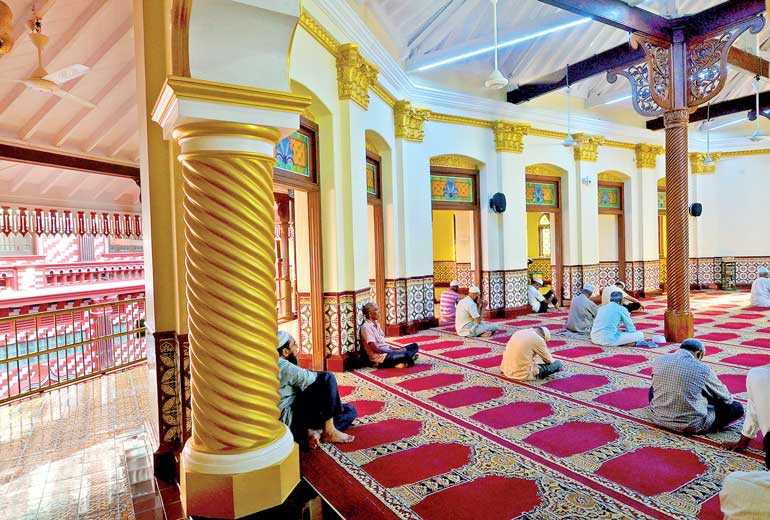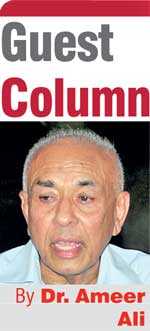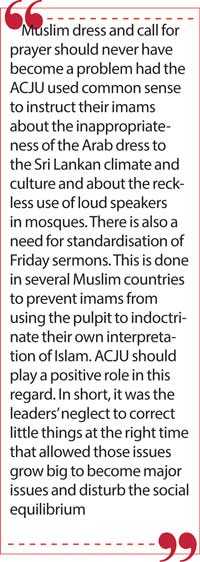Thursday Feb 19, 2026
Thursday Feb 19, 2026
Friday, 10 May 2019 00:00 - - {{hitsCtrl.values.hits}}

The immediate task
As said already in part (I) ordinary masses must be kept out of the terror equation and responsibility falls totally on political and religious leadership. The immediate task for the Government is to guaranty the safety and security of all innocent Muslims and prevent a recurrence of 1983. 
Immediate protection must be provided to the refugees from foreign countries irrespective of their religious denomination. One cannot eradicate one evil with another evil. In this context, it is heartening to see Walpola Rahula Institute headed by an enlightened scholar monk Ven. Galconda Dhammananda is speaking loudly on the need to protect innocent Muslims, and joined by the Archbishop of Colombo Malcolm Cardinal Ranjith and popular personalities like cricketer Sangakkara.
It is time for Buddhist and Christian compassion to come out strongly and protect the Muslim masses from senseless recrimination. This is the fasting month for Muslims and they need some peace to fulfil their religious obligation.
One reason why Sinhalese-Muslim relations have deteriorated over the last decade or so is because of discriminatory behaviour by police during times of trouble. Even during the Negombo violence of two days ago reports are coming that police action was not quick and tough. Why?
Secondly, an honest investigation by an independent commission should be carried out to unearth the full story behind the Easter infamy.
There are a number of unanswered questions, especially with regard to the handling of information intelligence. The activities of NTJ and Jamaathe Millat Ibrahim appear to have been brought to the notice of some powerful politicians and security officers even before the Mawanella bigotry in December last year.
Why was this information not acted upon? Who stood to gain by allowing this carnage to take place? These are questions that need honest answers.
Tasks for the future
Sri Lankan authorities should not repeat the same mistake Western governments are doing in handling terrorism, i.e., to rely solely on a hard line approach and allowing security officers to handle the situation.
The culprits should be caught no doubt and punished, but the entire community should not be asked to apologise for the action of a few. This is counterproductive and has led to an escalation rather than reduction in terror related incidents. One should understand that there is an ideology that is producing terrorism and that ideology has to be confronted and defeated.
As mentioned in Part (I) the ultra-conservative Wahhabism was given freedom to spread by Western powers in order to counter Iranian radicalism. That radicalism was targeting to topple the monarchical, dictatorial and oligarchic regimes of the Sunni world whereas this one, in its extreme form, is targeting everyone who does not embrace its teachings. The government authorities and the Muslim community are facing an ideological war, which they have to win. More on this soon.
To start with, the Government and its agencies must seriously plan a campaign to instil in the young minds the idea that Sri Lanka belongs to all its citizens irrespective of their ethnicity or religion and that they all have equal rights and duties. That campaign must counter the one by the Buddhist far-right that wants the ‘majority to consume the whole’. 
To defeat the far-right the ethnic issue that has driven this country to this situation must be resolved as a matter of urgency. To say that the north needs not a political settlement but an economic deal is to deny the Tamils any political participation in running the country.
If Sri Lanka wants to become another Singapore it should first learn how that country tackled its ethnic issue. They are Singaporeans first and Chinese or Indian or Malay second. Even Malaysia that introduced its Malay first Bumitputra policy in 1970s has come to realise its futility and is now saying, ‘Malaysia for Malaysians’. The same Mahathir who advocated majoritarian politics when he was in his fifties, sixties and seventies is now renouncing it in his nineties. What a self-realisation?
The campaign, Sri Lanka for Sri Lankans, must be carried primarily through reforming the educational curriculum in schools. In teaching social science subjects like history, literature and religion, school texts that are in use today try to impart an ‘us versus them’ attitude, with ‘us’ always deemed superior compared to ‘them’.
Having separated the children through language already, text book lessons are widening that separation even further. In short, education has created soft apartheid. Why shouldn’t a Buddhist, Hindu, Christian or Muslim child learn the basics of each other’s religion and culture? This is a huge topic which need be revisited in the interest of nation building.
When is the occasion for all Sri Lankans to come together and celebrate their togetherness, sharing the same food and enjoying the same entertainment? All public holidays (there are too many of them) except 1 May and 4 February are religious and celebrated by a particular religious or ethnic group. Why can’t the nation cut down a few religious holidays and substitute with one public holiday just to celebrate by all communities together without any religious tamasha? That should be the national day.
The other problem facing the government is to extricate Saudi and Qatar money and labour market from Wahhabi ideology. Saudis in particular have invested a lot in the country and Saudi and Qatari labour markets absorb a significant proportion of Sri Lanka’s surplus labour. Wahhabi/Salafi ideology is the string attached to this philanthropy. How to separate the ideology from economic benefits is going to be a diplomatic nightmare to the government.
Muslim community
To the Muslim community time has arrived for serious self-introspection. It has to come out from the state of denial and confront the issues head on. That needs action on several fronts.
First of all, until the 1980s and for nearly 12 centuries, except for the 1915 aberration, which was soon forgotten by all, Muslim community enjoyed an uninterrupted peaceful and prosperous existence in this country, which had no parallel anywhere else in the recorded history of Asia.
How many of the Muslim children know about this past? Do Muslim schools and madrasas teach this history to their students? If that glorious history is understood then the next question is why was that history disrupted after 1980?
Part (I) of this analysis discussed that question. In that discussion, the impact on the community of an international connection, particularly with the Arab world and more specifically with Saudi Arabia, the religious awakening in the Muslim world in the 1980s and 1990s, and the founding of SLMC as a political party were highlighted.
Given these facts, Muslim leaders and intellectuals have to consider how to combat the Saudi born ultra-conservative Wahhabi orthodoxy that is influencing Muslim religious institutions and through them the hearts and minds of young Muslims, and leading some of them at least to fall prey to extremist ideas in the name of Islam.
The National Tawheed Jamaat and Jamaate Millat Ibrahim involved in the Easter carnage are two such institutions that were born from the womb of Wahhabism. What measures were taken to discipline these children by the leaders who are now accusing them? What sort of Islamic education is being taught in Muslim schools and madrasas, what topics are being dealt with in sermons delivered on Fridays and what role does ACJU play in these sermons are issues that have to be revisited and resolved rationally.
There is an absolute need to modernise madrasa education. Modernisation does not simply mean introducing modern teaching techniques, but goes far beyond that and involves reforming the curriculum of madrasa education.
For example, how many of the graduates who pass out of these madrasas have any knowledge about how plural societies were built and managed in Baghdad, Cordoba and Delhi during Islam’s high noon? How many of them are familiar with the works of great Sufi poets like Ibn-Arabi, Ghalib, Nijami, Sa’adi and Rumi which teaches love, tolerance and inclusion instead of fear, hatred and exclusion? Do they learn subjects like comparative religion and philosophy? If not why not? Such knowledge is absolutely essential particularly where Muslims live as minorities in plural societies.
Madrasas are producing memorisers and summarisers who delve in the past and not analysers and innovators who can provide leadership towards the future. In fact, orthodoxy does not encourage innovation because it considers it as bid’a or heresy. Reforming madrasa education cannot be postponed. ACJU wants the education ministry to regulate madrasas. That is not sufficient.
There is also a need to widen the syllabus covered in subjects like history, literature and religion taught in Government Muslim Schools to make those subjects inclusive of knowledge about other societies, their literature and culture. In fact that sort of changes should be introduced in all schools throughout the country.
With reference to education, there are rumblings heard in relation to a university like complex being built in Punanai, one of the least populated areas in the Batticaloa District. The exact story about this complex is unclear. Some say it is for a Sharia university, which Sri Lanka does not need. There is evidence however that a substantial amount of Saudi money has gone into its construction. It will be in the interest of the whole nation if that complex, when completed, turned into a research centre for agricultural and veterinary sciences or a university for post graduate studies.
Islam should not be an irritant to followers of other faiths. In fact it had never been an irritant throughout the ages, if one cares to study its history without prejudice. It is the same scripture that produced Wahhabi exclusivism also produced inclusive Sufism and intellectual rationalism. The fault is not in the scripture but in the way one understands it.
Similarly, Muslim dress and call for prayer should never have become a problem had the ACJU used common sense to instruct their imams about the inappropriateness of the Arab dress to the Sri Lankan climate and culture and about the reckless use of loud speakers in mosques.
There is also a need for standardisation of Friday sermons. This is done in several Muslim countries to prevent imams from using the pulpit to indoctrinate their own interpretation of Islam. ACJU should play a positive role in this regard.
In short, it was the leaders’ neglect to correct little things at the right time that allowed those issues grow big to become major issues and disturb the social equilibrium. Either ACJU should wake up and become proactive or disappear from the scene and make way for a progressive body to take over that leadership.
Islamic civilisation was built on the edifice of social pluralism and Convivencia. Under that model, every community was allowed to live with its own religious rules and customs but with undivided allegiance to the ruler. Islam taught how minorities should be treated under Muslim rule.
Unfortunately Islam’s past has no guidance to show how a Muslim minority should live in a non-Muslim society. This is the challenge facing not only Muslims in this country but also the one-third of world Muslims living as minorities today. Sri Lankan Muslims cannot ape the ways and means of Muslim majority countries.
On a political level, why do Muslims need a political party of their own? The formation of SLMC was a major blunder and as explained in part (I), it allowed Islamism to creep in without being noticed. Ashraf’s opening address in the Parliament in 1990, with the declaration of takbir, Allahu Akbar, may have driven his supporters to ecstasy, but did he realise what a genie he was un-bottling at that time? Why did the Speaker allow this happen at that time?
It is a joke to have a political party of your own, and when an election comes, its leaders contest on another party’s ticket and symbol. After winning and entering the parliament they again unashamedly claim that they represent their own party. This can happen only in Sri Lanka. Isn’t it true that among the current SLMC and ACMC parliamentarians only one contested and won on SLMC ticket? I said this before and I am saying it now. This party must be dissolved and Muslims should go back to their pragmatic politics of 1950s and 60s and identify themselves with national parties.
With the Easter carnage Muslim community has reached a cross road and a wrong turn from here will lead the community to more disasters. Muslims must recover their lost heritage. An enlightened Muslim leadership is the vital need of the day.
(The writer is attached to the School of Business and Governance, Murdoch University, Western Australia.)
